The Backwaters of Kerala
![]()
A green, watery stretch of land, reaching from the Arabian Seacoast into the Western Ghats, the state of Kerala, designated by the Kerala Tourist Development Corporation (KTDC) as 'God's Own Country', was our first destination after our brief R&R stay in Mumbai.
Kerala has become rather famous for electing a Communist government back in 1957 that implemented a bundle of progressive policy's to redistribute land, reduce poverty, provide health care, and raise the literacy rate to nearly 100%. More recently, through the efforts of the KTDC, international tourists have flocked to Kerala to enjoy the lush, tropical greenery, smaller cities, unique and tasty food, beaches, but most of all to explore the Backwaters.
Kerala's great monsoons bring a wealth of fresh water down from the Ghats to the coastal lowlands forming the Backwaters, a system of streams, rivers, fresh and tidal lakes enhanced by canals and levees, running parallel with the coast for hundreds miles. These waters have supported the rural people of this coastal region for generations.
Our own exploration of the Backwaters began with a tour arranged by KTDC in Kochi. We joined a small group of seven other travelers to ride by van to a mooring where our craft, a Kettu Vellam houseboat, was waiting. These traditional boats made from natural materials by artisan boat builders, were originally designed for transporting rice to market. Recently, they have been converted into houseboats, often very luxurious, to enable visitors to experience life here.
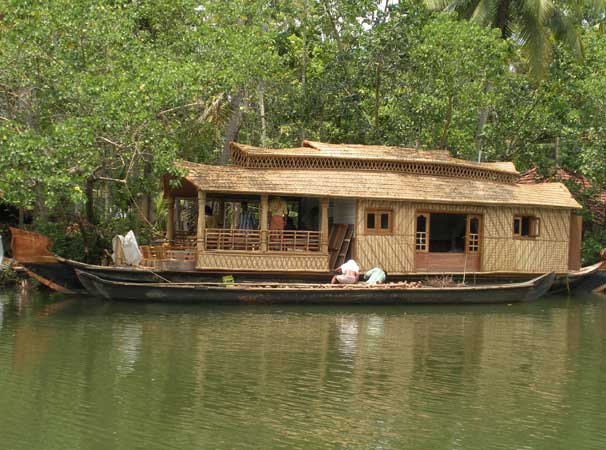
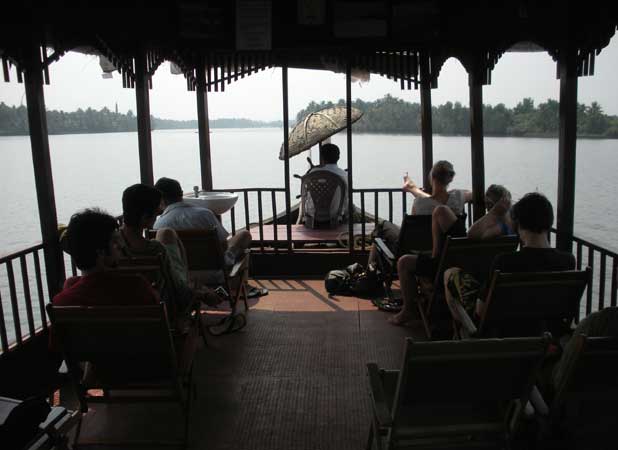
As the boat chugged away from the mooring, our guide told us about the livelihoods of the people living on the Backwaters - mussel fishing, sand gathering, toddy harvesting and coir rope spinning. By the end of the tour, we understood each of these a bit better.
As soon as we entered Lake Vembanad, a huge tidal basin whose slightly brackish water supports a rich mussel population, we understood the first livelihood! Men poled small boats over the mussel beds and raked up the shelled critters.
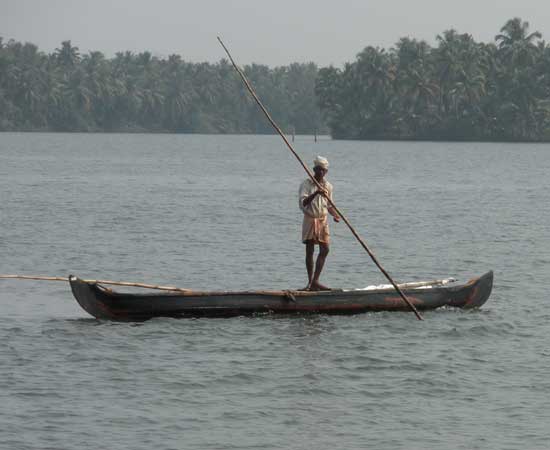
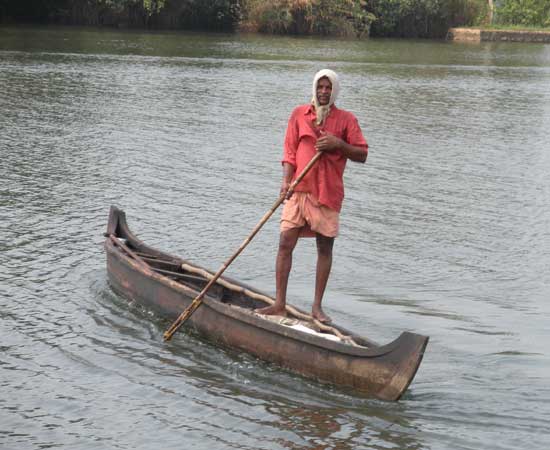
We were offered the chance to try Mussels Keralan style and Susan decided to temporarily forego vegetarianism to try these tasty morsels!
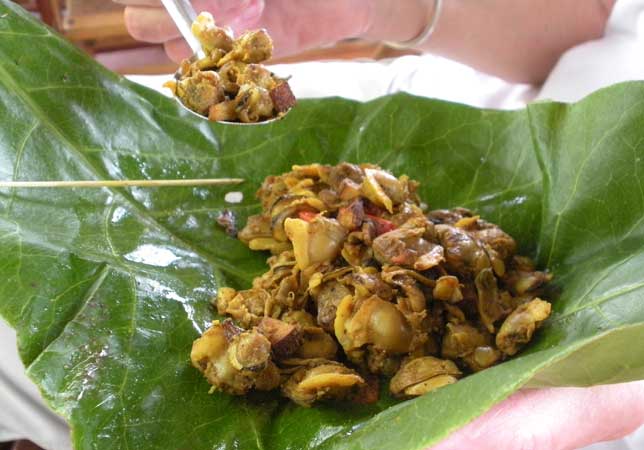
The sand gatherers were also evident - their larger boats, piled high with golden sand, floated low in the water. We learned that this sand is especially prized for making concrete for building.
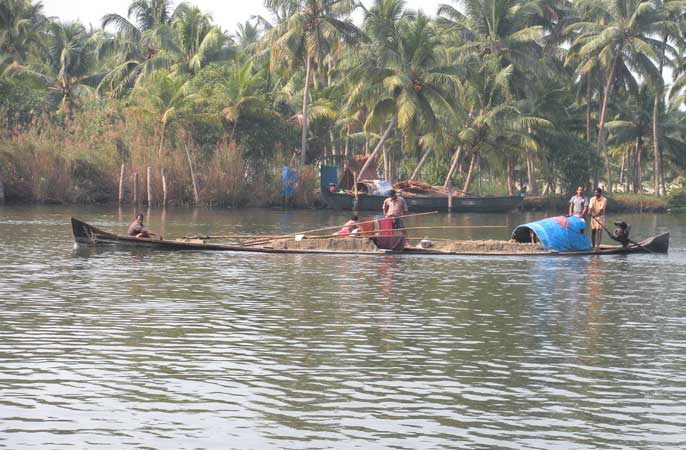
After traveling through the calm waters of the lake, savoring the tranquil vista of blue water and green palm fringed land, we passed several islands which we learned had significant populations, their mobility needs provided for by regular ferry service.
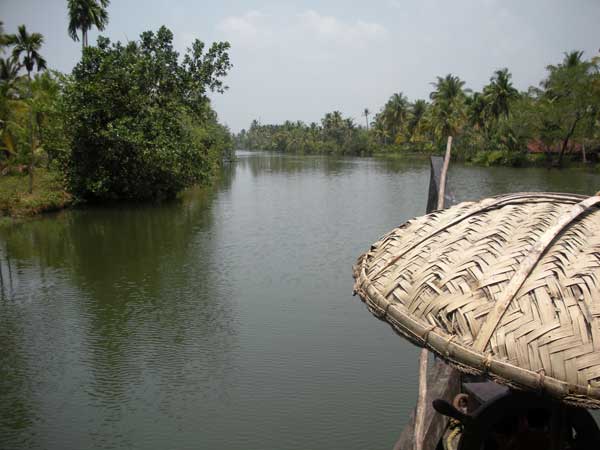
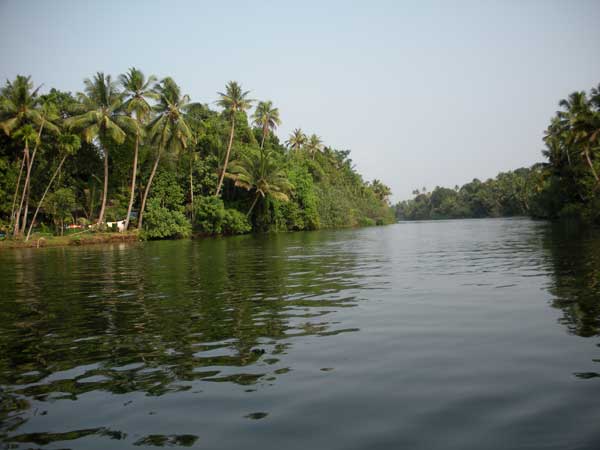
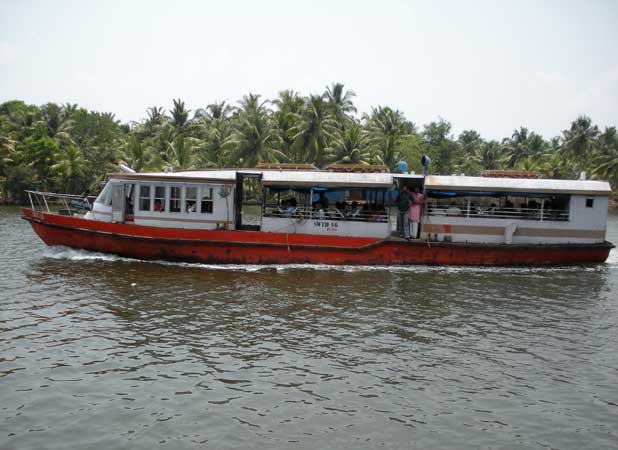
We stopped for a walk around one of the islands to watch toddy harvesting. We had noticed signs for Toddy Shops but had no clue of what this was. We learned that the flower of a coconut palm, a long pod that shoots from among the fronds, holds sap that, when harvested, soon ferments into a beer-like mildly alcoholic beverage. The gatherer climbed the tree, cut off the top of the pod, pounded the sides and captured the rising sap in a dish. We tried this, too, and found it not unpleasant, but decided we preferred Kingfisher beer!
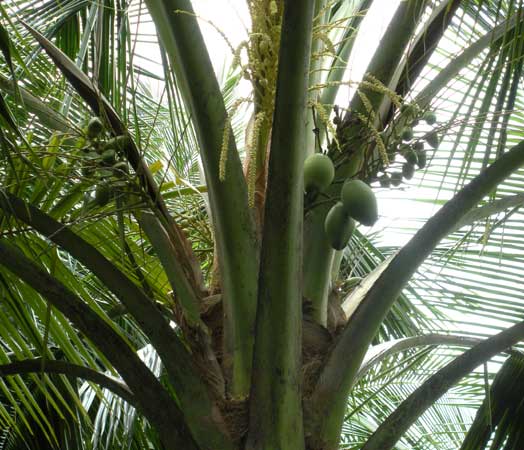
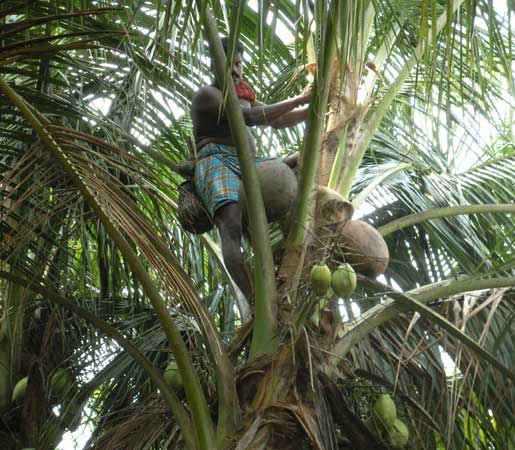
Returning to the boat, we dined on a scrumptious lunch of Keralan food,
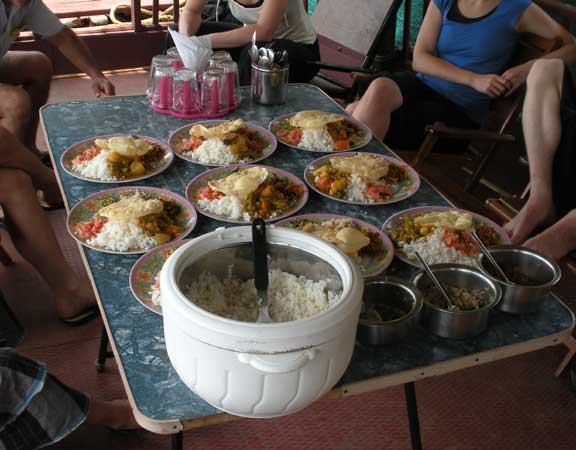
We then traveled by van to another waterside location where a small open wooden boat was waiting. Moved by men with long poles, we glided into a narrow canal shaded by lush vegetation.
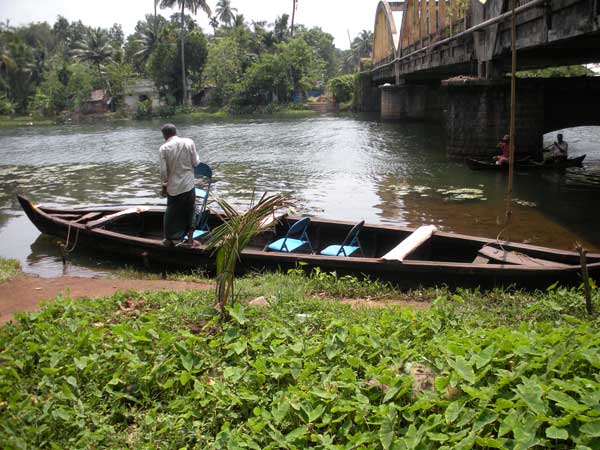
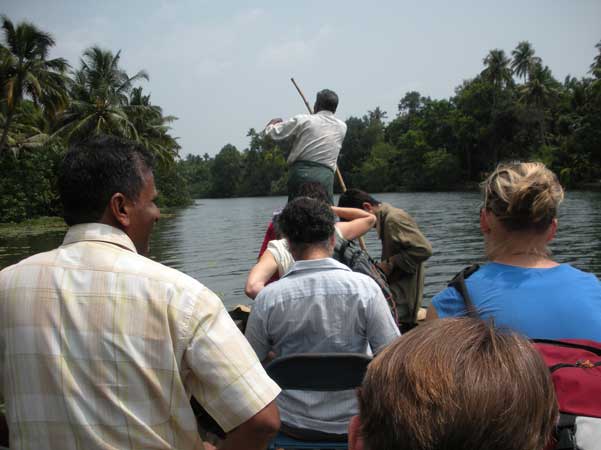
We soon turned into an even narrower channel and slowly traveled past charming small homes, smiling people, children waving and a group of women working to clear vegetation from the channel. Bright blue Kingfisher birds entertained us with flashes of color overhead.
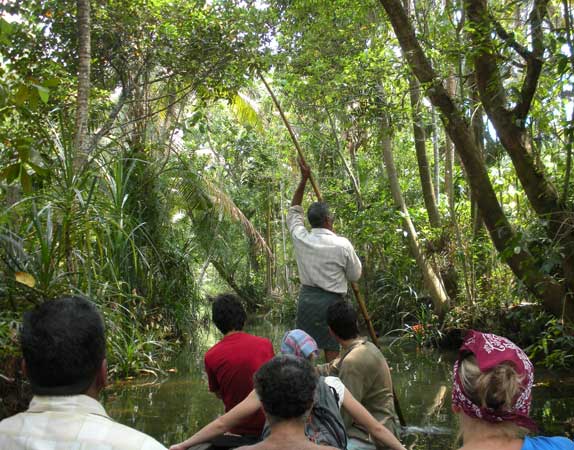
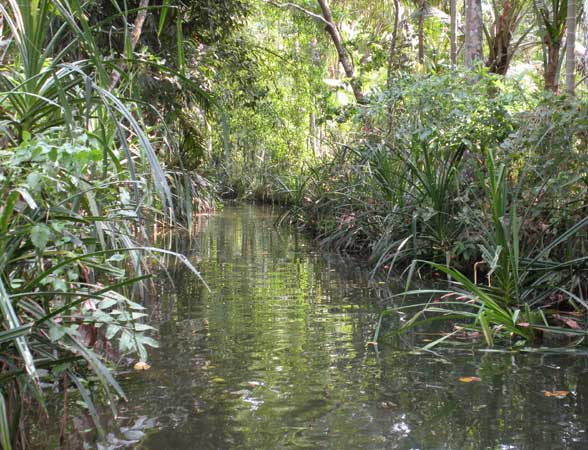
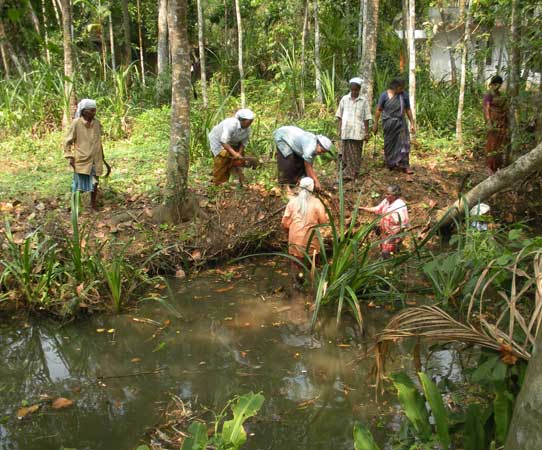
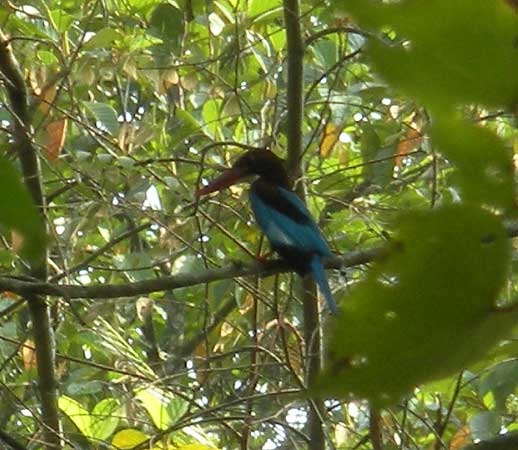
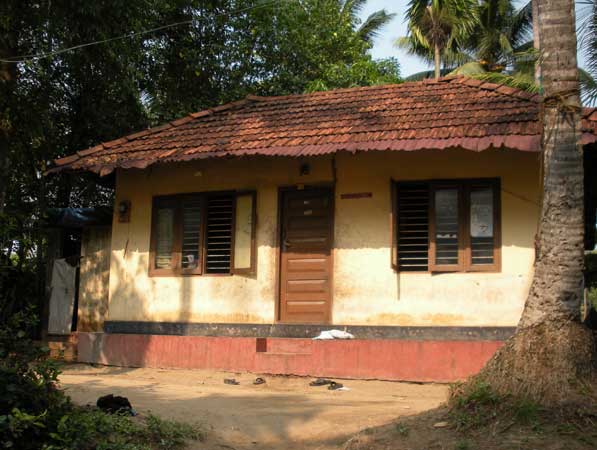
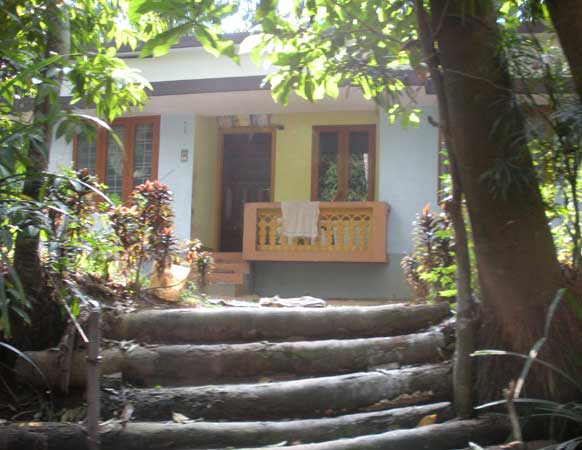
One last stop provided a brief demonstration of spinning coir (fiber from coconut husks) into threads that are made into rope or woven into mats. Then we glided back to the van for the trip back to Ernakulum.
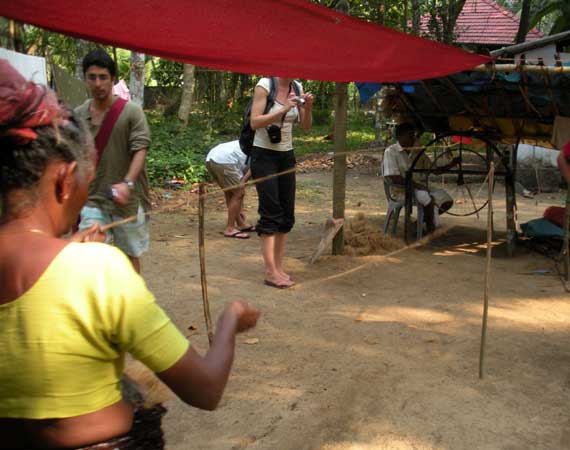
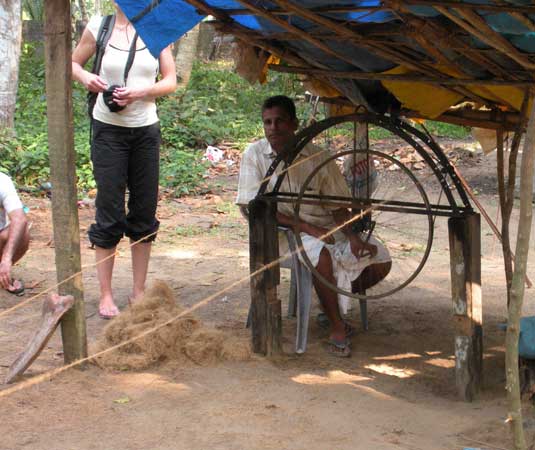
Indeed, Kochi (Cochin) harbor including the landside modern section of Ernakulum, peninsular historic Fort Cochin and Mattencherry, and Willingdon Island where a Naval base, container port and ship building complex, sits at the confluence of Lake Vembanad and the Arabian Sea. Here public ferries offered opportunities to ply the waters of the lake, but usually with sizable crowds of other folks. Wishing for a calmer harbor tour, we strolled along the waterfront, past boat jetties lined with boats, mostly large ones with upper decks for sightseeing, all sitting idle.
We learned that this was the slow season and there were no regular harbor tours, but we could hire a whole boat for two hours for only 900 rupees (US$18)! Hiring a whole boat seemed much too extravagant but we wanted to go, and we realized that we'd be creating work for three guys who probably would not be paid unless the boat left the jetty with paying clients! So, for the next two hours, we sat on the top deck, enjoying the experience of being Captain and First Mate of this vessel!
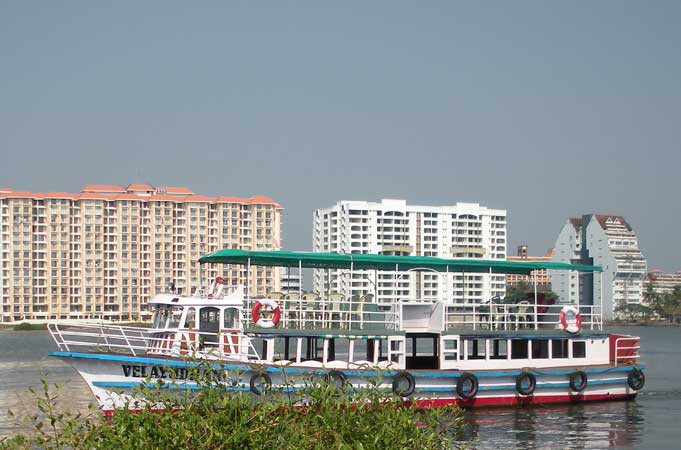
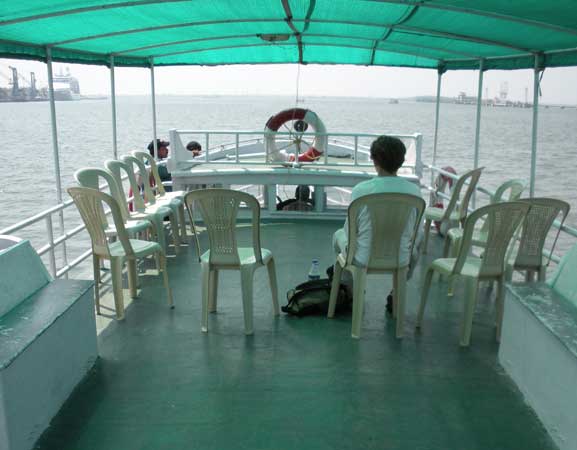
A few scenes of places we passed; Kochi waterfront and the ferry jetty
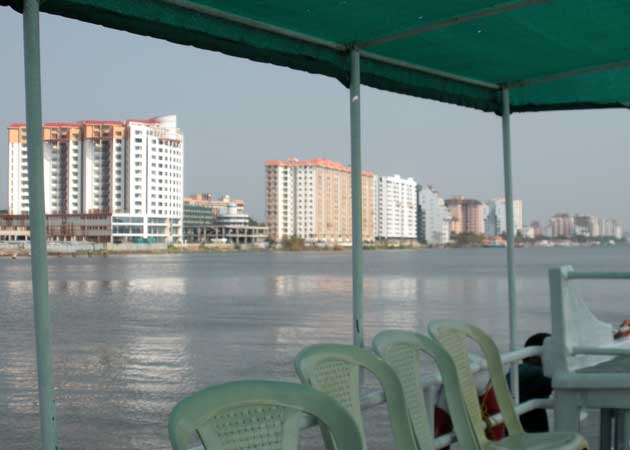
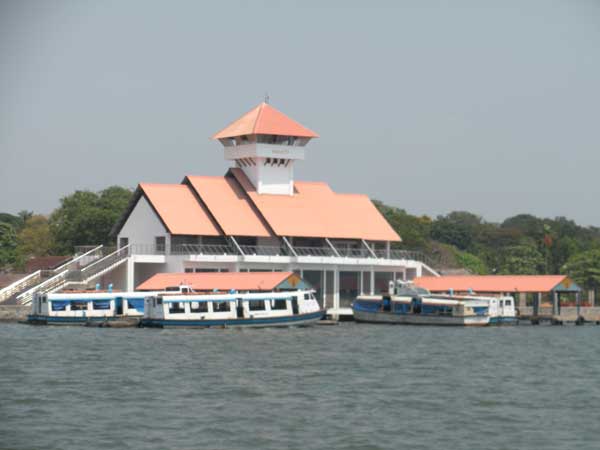
The oil terminal and the shipyard
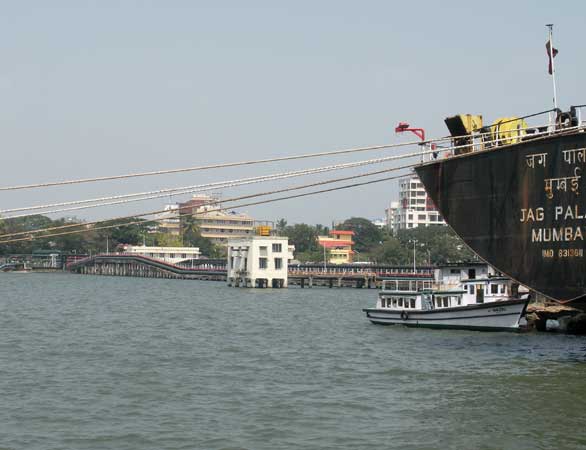
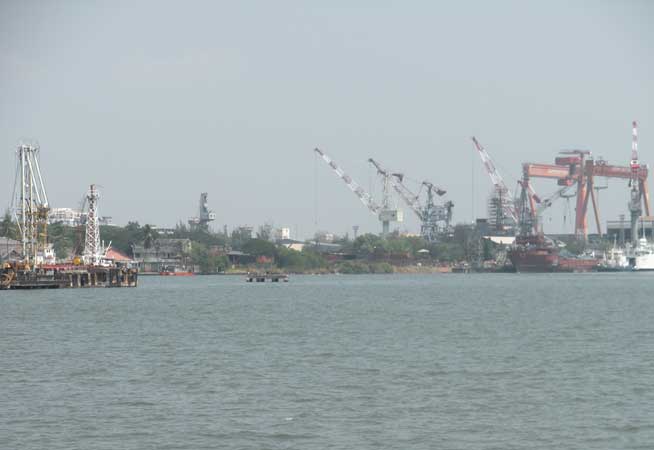
Cruise ship dock and the Taj Mahal Hotel
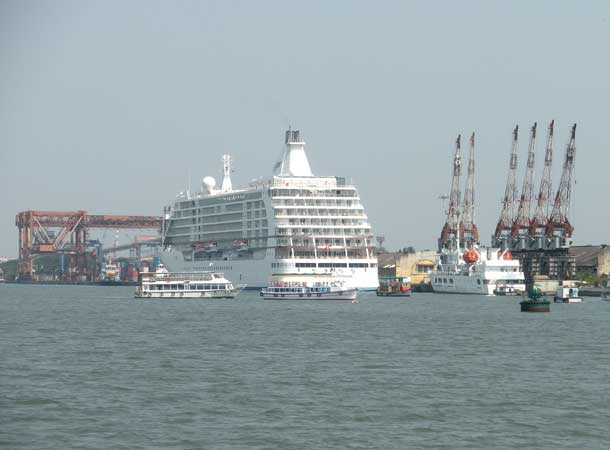
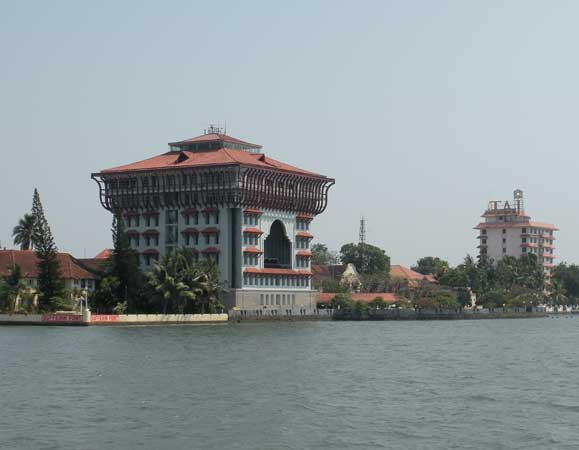
Several days later, we had the opportunity to explore more of the Backwaters, this time, starting from Kottayam, a city further south. Our vessel was an old wood boat with seats shaded by a roof, one of the many that provide local ferry service along the canals and lagoons. The boat pulled away from the mooring, gliding through thick mats of water hyacinths and proceeded through narrow canals, making regular stops to pick up and let off passengers and in some cases freight.
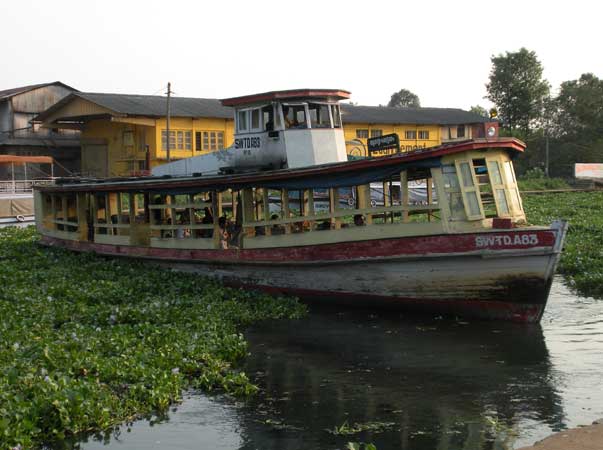
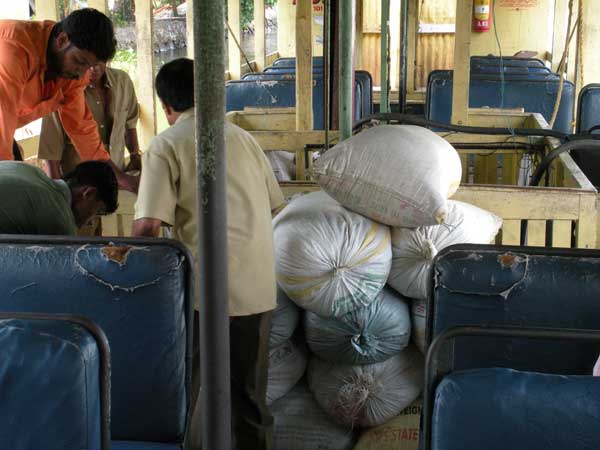
The glimpses of life in the homes along the canals and the vast stretches of paddy beyond soon put us into a calm, dreamy state of mind that we'd missed before. We were sad when the boat pulled into Alleppey - we were definitely getting accustomed to the slow quiet life on the water.
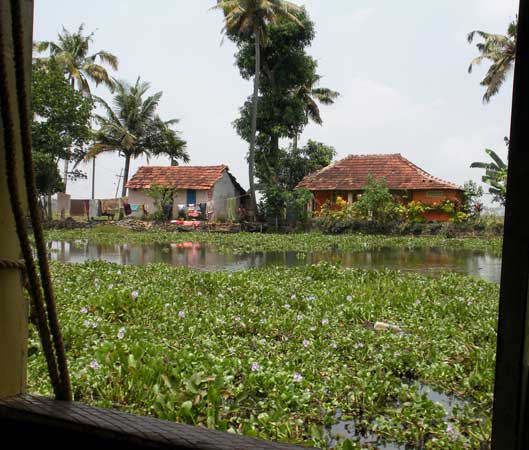
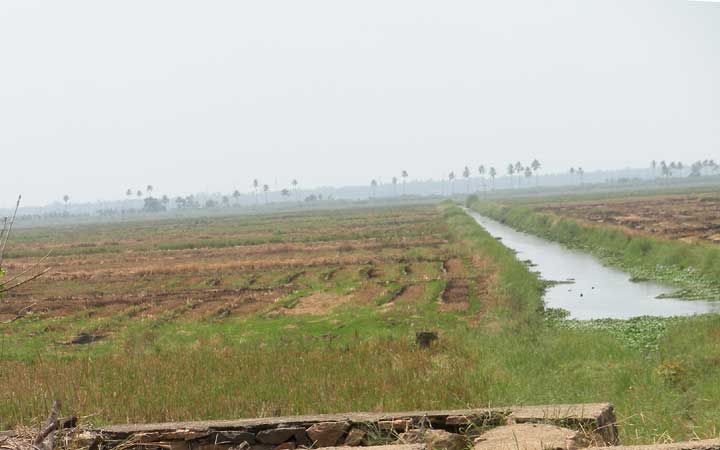
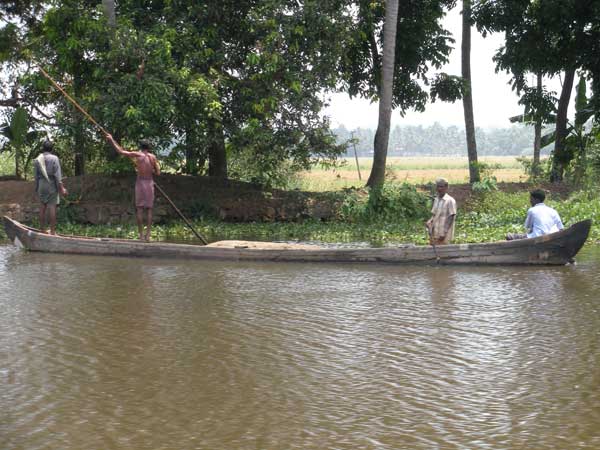
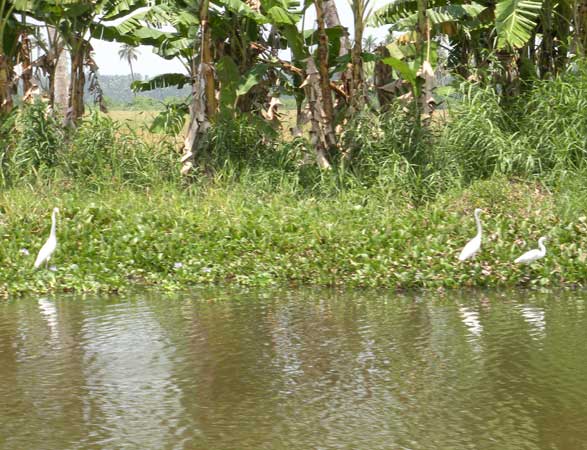
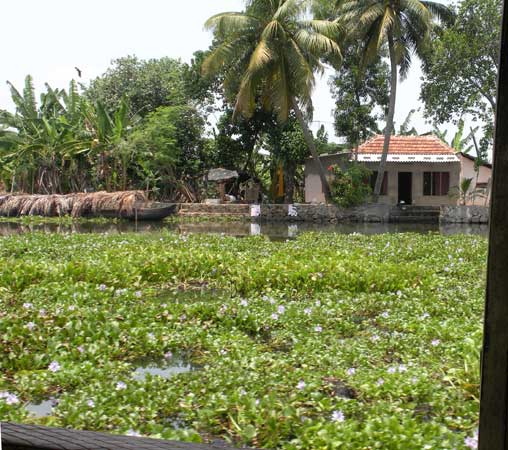
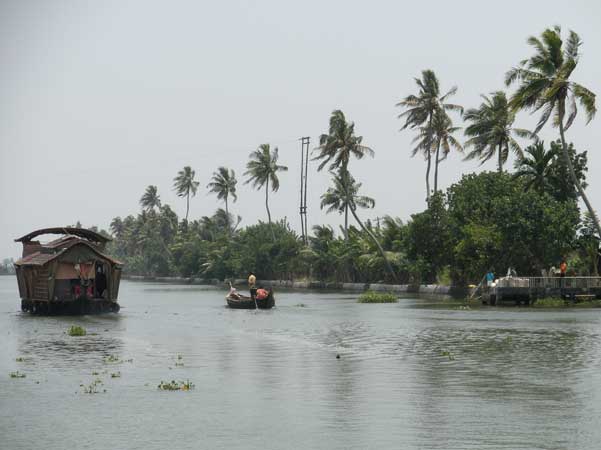
Reflecting on our Backwaters experiences, we found ourselves hoping that the Indian and foreign tourists who visit this special place would not love it to death, but would bring enough money to enable Kerala and the Backwaters folks to preserve this unique way of life!
A Closer Look Reveals an Ecosystem in Crisis!
Our wishful thinking that the Backwaters were a serene, untrammeled, watery source of traditional livelihoods for the local people was debunked by a timely story in the May 8 issue of Frontline, one of India's national news magazines. Titled, "Wetland or Wasteland" this story detailed the many sources of pollution that threaten the waters of Vembanad Lake, including the disturbance of the salinity balance due to closure of a barrage in summer, agrochemicals that drain into the lake from the rice paddies, sedimentation from deforestation, solid waste accumulations, outfalls of untreated wastewater....whew! We were boggled by this news!
Fortunately, there is hope for change. The Ashoka Trust for Research in Ecology and the Environment (ATREE) sent in a team of ecologists and other folks to implement a multifaceted program to tackle these problems! We certainly wish them great success.
Click here to return to Our Revisiting India - 2009 page
![]()